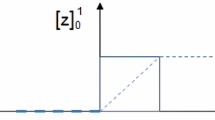Abstract
This paper concerns discrete-time multiobjective Markov control processes on Borel spaces and unbounded costs. Under mild assumptions, it is shown that the usual “scalarization approach” to obtain Pareto policies for the multiobjective control problem is in fact equivalent to solving the dual of a certain multiobjective infinite-dimensional linear program. The latter program is obtained from a multiobjective measure problem which is also used to prove the existence of strong Pareto policies, that is, Pareto policies whose cost vector is the closest to the control problem’s virtual minimum.
Similar content being viewed by others
Author information
Authors and Affiliations
Corresponding authors
Rights and permissions
About this article
Cite this article
Hernández-Lerma, O., Romera, R. The Scalarization Approach to Multiobjective Markov Control Problems: Why Does It Work?. Appl Math Optim 50, 279–293 (2004). https://doi.org/10.1007/s00245-004-0804-4
Received:
Published:
Issue Date:
DOI: https://doi.org/10.1007/s00245-004-0804-4



